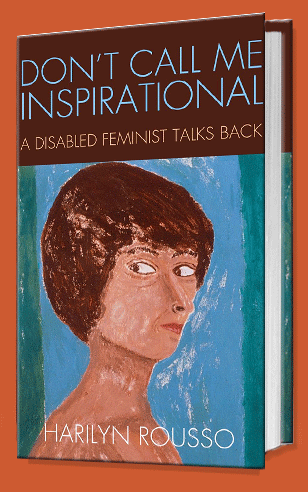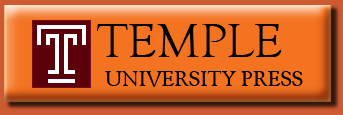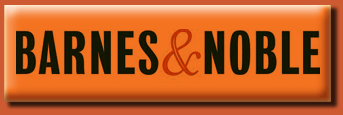Don't Call Me Inspirational Overview
You’re so inspirational!” “You’re so brave!” (Cue the heroic music!) Or from the less inhibited: “What a shame!” “What’s wrong with you?” That’s the background noise of Harilyn Rousso’s life. Don’t Call Me Inspirational: A Disabled Feminist Talks Back, through intimate anecdote and observation, gives the lie to such nonsense and describes the damage it causes.
Rousso’s memoir is about overcoming prejudice against disability, not disability itself. It confronts not only prejudice but also the ways so-called “normal” people distinguish people with disabilities from everyone else by seeing them through the comforting but distorted lens of heroism, nobility and triumph over adversity—stereotypes that kill with kindness.
The book, a collection of short takes and longer narrative sections, is divided in five parts. The first, “Close Encounters with the Clueless” describes the often absurd and ignorant attitudes of friends, strangers and society. The cast of characters includes a beggar who won’t take a dollar from Rousso, a mere “cripple,” and a stranger in a coffee shop who wants her gone if not dead.
The second, “On Leaving Home,” focuses on family, describing, for example, Rousso’s relationship with her sister who teaches her the meaning of “fuck,” and with her mother who sends her off to college to face and find herself.
“On Not Looking in The Mirror” describes Rousso’s own prejudice toward her disabled body and her use of art and reflection to make peace with her seemingly unfeminine walk, speech patterns and facial movements.
In “What’s a Woman,” Rousso reflects on her father’s unspoken message that no man would want her, describes her abandonment on the day she buys her wedding dress, and portrays the healing effects of meeting the love of her life and discovering she’s not alone in hating her body (it’s a women’s issue, stupid!).
“On Claiming Disability” describes Rousso’s involvement with the disability rights community, particularly the disabled women’s community, enabling her to claim disability as a source of pride, positive identity and rebellion. She expresses her frustrations with able-bodied feminism, describes outrageous escapades with her disabled sisters, reveals her self-doubts and discoveries in her work with disabled adolescent girls, “disses” normalcy, exorcises the phantom freak within her, and offers an ode to her disabled self.
A collage of images about Rousso’s life, rather than a formal portrait, Don’t Call Me Inspirational describes what it takes to move beyond the lies and clichés to forge a fulfilling life filled with love, work, community and rebellious acts.
Media Reviews/Features
"....many pops of insight....a very intimate book....[Rousso] says that, like many disabled people, she is open to difference, spurred to activism, and good at problem-solving--because her daily life incurs all three." ---The Boston Globe
"....a frank, forthright, and thoughtful memoir....Overall, the book advances disability activist and scholarly investigations of embodiment, sexuality, and what it means to 'claim disability' personally and collectively....It is also an invaluable asset to the archives of feminist disability activism."---Disability Studies Quarterly
http://dsq-sds.org/article/view/4022/3537
"Don't Call Me Inspirational is....a coming of age story, a family memoir, and a collection of beautifully written essays on what disability means to one woman. It is also in-your-face straight talk for everyone who assumes disabilities are all the same, all 'less than,' all wishing that they were different from the way they are. [Rousso] shows how the label 'inspirational' is often just more way of expressing a sense of difference rather than an understanding of equality....[It is] lively, insightful and moving reading for both general audiences and scholars."---Women's Review of Books
"Rousso's story of coming to terms with disability is at once unique and universal..... Rousso's compelling story is less a memoir of endurance than a fine model for feminist development."---Ms. Magazine
"This collection of 52 short essays and meditative fragments is aptly described by the author, a psychotherapist, disabilities activist, and artist, as “a collage or a series of images” rather than a more formal memoir. …From early childhood, Rousso struggled to find her place in the world. She writes of her need to achieve independence from her loving family; her longing for a relationship with a man; her overcompensation, which throws her into a world of academic achievement; her loneliness and her need to be alone. When she writes of the psychotherapy institute where she was training asking her to leave…she, and her reader, recognize the prejudice she has faced. Now identifying as disabled, she is propelled into the fight for the rights of women with disabilities. …its painful honesty is affecting."---Publishers Weekly
http://www.publishersweekly.com/978-1-43990-937-9
"Engaging...an unusual, compelling read."---Library Journal
"An inspirational affirmation of the unique worth of every individual."---Kirkus Reviews
http://www.kirkusreviews.com/book-reviews/harilyn-rousso/dont-call-me-inspirational/
"It's Harilyn's hope that her book will reach the broadest possible audience. That includes the disability community, especially young women. She wants them to know that 'you can claim your disability, acknowledge it and have a full, rich life.'...Harilyn also wants to reach the rest of us, those interested in women's studies, human rights, the arts, creativity, fans of memoirs, and people who just like a good story. It spoke to me, especially given the long war I waged against
my own female body."---Huffington Post/ICS Voices Blog www.huffingtonpost.com/angela-bonavoglia/don't-call-me-inspirationa_b_2778003.html
"...You need Don't Call Me Inspirational if you are teaching disability, feminist, gender or queer studies (to start with the short list). You need this book if you have a disabled family member or friend. You need this book if you have ever confessed, to yourself or to an acquaintance, about somebody disabled by severe injury or illness, 'I wouldn't want to live this way.' You must especially need this book if you attribute special courage and grit to disabled people trying to teach a class, pay their taxes, drive to work, buy shampoo or otherwise go about their business....This is a book that is full of generative critique, embedded in the story of a life that itself has many lessons to teach. Don't call it inspirational: call it energizing. It is written in short chapters, with an accessible style that is alternatively funny, wry, serious and acerbic." ---Chronicle of Higher Education blog Tenured Radical
"Harilyn Rousso's Don't Call Me Inspirational" is certainly a welcome arrival. While young women with disabilities can greatly benefit from the book, the author also has a larger audience in mind. Rousso states, 'I hope to reach a broad range of audiences including those interested in disability issues, women's issues, youth issues--and simply those who like a good story.' Indeed, there are few people who will not gain something from the book. Able-bodied readers are almost guaranteed to discover that they are guilty of many condescending phrases or inconsiderate actions that Rousso has described herself the object of--and not everyone with a disability is off the hook either. She poses tough questions about passing, something that as an adolescent she desperately wanted to do. Another major factor in DCMI's favor is that it is accessible. The chapters are short and the bwriting style conversational. The book is mercifully free of jargon."--Wordgathering
http://www.wordgathering.com/issue25/reviews/rousso1.html
"[E]xtraordinary.... Memoirs suceed when they provide readers with a gut feeling of what the author's life is like, and Rousso indeed opens the door to her world... [She] writes with intelligence, passion, humor and spunk."---Jewish Week http://www.jewishweek.com/special-sections/healthcare/embracing-her-own-disability
"Rousso is an activist, artist, educator, social worker, psychotherapist, writer, painter and advocate who has worked in the disability rights field. The book follows her journey from 'passing'—pretending that she didn’t have cerebral palsy—to embracing her disability. In the late ’70s, she began exploring her disability identity, and she writes with honesty and power."---Jewish Women
http://www.jwi.org/page.aspx?pid=3478
What people are saying about Don’t Call Me Inspirational
“I've known Harilyn Rousso as a powerful activist and gifted artist, but with this revelatory book, she becomes something even more rare: a storyteller who conveys her uniqueness, and so helps us to discover our own. Don't Call Me Inspirational is irresistible to read, honest, insightful and universal.”
—Gloria Steinem
“Don't Call Me Inspirational reads like a collection of eloquent, timeless letters to the world. Rousso writes to her readers as if she knows each and every one of us, and wants to strengthen the bond we share. A disabled woman's life has never been so thoughtfully and beautifully rendered—in fresh, vital prose with candid humor and a vivid imagination."
—Simi Linton, author of My Body Politic and Co-Director of the film Invitation to Dance
“Don’t Call Me Inspirational is stunning, a pleasure to read. Rousso’s outstanding book is both a beautifully written memoir about growing up in the 50’s, and a critical historic analysis of disability politics. She moves through a life, diving into gender/sexuality/embodiments/disability politics with grace and honesty. Nothing is simply resolved, but lived, moved through, engaged, struggled over, and then re-visited.”
—Michelle Fine, Distinguished Professor of Psychology at the Graduate Center, City University of NY



